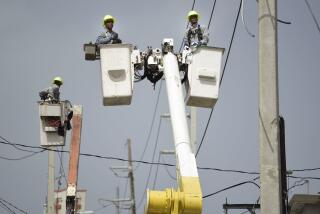Utility Bills Cause Uproar in Nicaragua : Central America: Restructuring the economy sent rates skyrocketing, shocking the public and foreign diplomats alike.
- Share via
MANAGUA, Nicaragua — When Nicaragua’s new government yanked subsidies for public services, utility bills took off and diplomats hit the roof.
But instead of simply refusing to pay, as many Nicaraguans are doing, the foreign officials organized a protest and their bills were put on hold pending an investigation.
“We pay the light and water (bills) when they are normal, but not when they are exaggerated,” said Soviet Embassy press attache Vyacheslav Spassky.
A diplomatic source said the Soviets were stunned by an electric bill in July for $4,000. Under the Sandinistas, who were voted out of office in February, monthly utility bills rarely exceeded a few hundred dollars.
President Violeta Barrios de Chamorro’s economic restructuring program passed the full cost of electric, water, sewer and telephone services to consumers.
Central Bank President Francisco Mayorga recently said the government reduced its monthly deficit from $28 million in April, when Chamorro took over, to $7 million in September.
Nicaraguans, however, have not quickly adapted to the new prices after a decade of Sandinista subsidies.
The first effects of the austerity program surfaced in July with food, gas and utility price increases that jolted people in a country where wages of less than $100 a month are common.
A government official, who asked that her name not be used, said her mother received an $800 water bill, based on the official exchange rate.
The black-market rate, once well above the official rate, is now only slightly better than at the banks.
“This goes beyond ridiculous. It is just incredible, it’s astounding, it’s, it’s . . . “ the exasperated official said.
With electricity, a typical family bill that was $8 a month is now around $117.
The diplomatic protest began in September at a dinner when somebody complained about soaring utility bills, said U.S. Embassy spokesman Stedman Howard.
Soon, all the 42 accredited foreign missions in Managua confronted the Foreign Ministry, which appointed a committee to look into the complaints and told the embassies to hold off paying bills until meters and consumption were checked.
Technicians found broken water pipes at the North Korean Embassy that explained high water bills there, said ministry spokesman David Silva.
But the Libyans would not let technicians in to check out the water meters, and Cuban officials complained that meter readers never got close enough to take a reading.
Although Howard declined to say how much the U.S. Embassy was being billed, he said his home electric bill went from $200 to $780 in one month.
“That’s indicative of the general trend,” Howard said.
More to Read
Sign up for Essential California
The most important California stories and recommendations in your inbox every morning.
You may occasionally receive promotional content from the Los Angeles Times.












